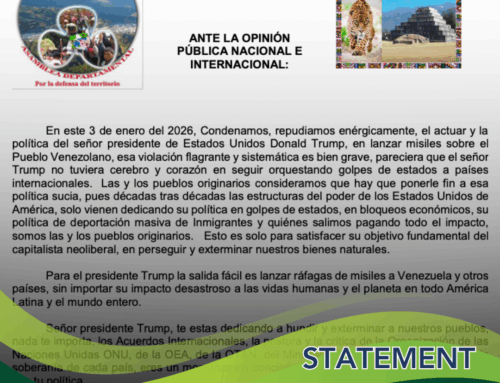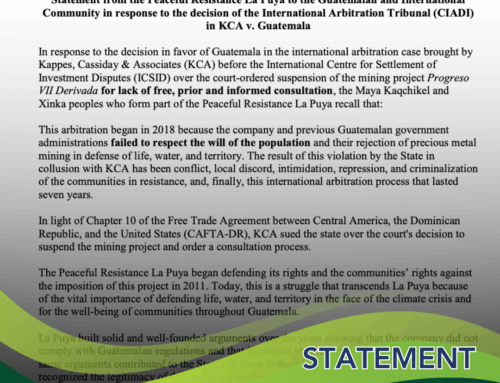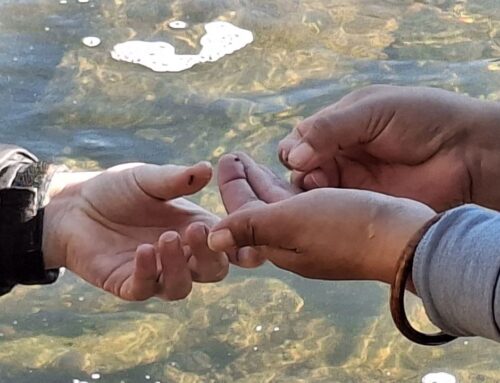 |
| Rubén Herrera and Cecilia Mérida moments after Rubén was liberated. |
Yesterday, Rubén Herrera, unjustly imprisoned since
March 15 for his resistance to the Cambalam hydro-electric project, was released from custody and cleared of all charges in one of two legal processes against him. The second process (176-2011) dating back to 2009, was provisionally closed at the request of the Public Prosecutor’s office. Judge Miguel Gálvez of Guatemala City’s High Risk Court “B” agreed with the prosecutor’s assessment that the evidence against Herrera was imprecise and contradictory, and granted the prosecution a six month time frame to build a better case or present closing arguments.
Beginning with Herrera’s
first hearing in Santa Eulalia, Huehuetenango, the Public Prosecutor’s office has maintained that the case lacks evidence linking Herrera to the crimes. Despite these arguments the presiding judge in Santa Eulalia, at the request of co-plaintiffs Ecoener Hidralia Energía/Hidro Santa Cruz S.A, ordered the case forward.
At the beginning of trial proceedings on Thursday, the Public Prosecutor reiterated its request to provisionally close both cases against Rubén Herrera citing a lack of evidence linking him to the accusations. What followed was an unusual scene, during which the lawyers at the prosecution table argued against each other. Lawyers for co-plaintiff Hidro Santa Cruz denounced the Public Prosecutor’s “surprising” request and “passive attitude”, and requested that Judge Gálvez proceed to trial. Joining the Hidro Santa Cruz’s legal team was a familiar face from the genocide trial, César Calderón, defense attorney for former director of military intelligence José Mauricio Rodríguez Sánchez.
During the three hours that followed, the defense team representing Herrera argued the two separate cases, demonstrating both the political nature of the charges, the questionable behavior of representatives of the judicial system in Santa Eulalia, and the lack of concrete evidence against Herrera.
In the 2012 case (65-2012), Judge Gálvez dismissed the charges outright. The case was permanently closed citing the fact that none of the testimonies provided by witnesses and victims in the case file even mention Rubén Herrera. In the 2009 case, Gálvez upheld the request from the Public Prosecutor to provisionally close the case stating that the accusations and arrest warrant were based on “two or three flimsy declarations”. Throughout the hearing, Judge Gálvez referenced his belief that social conflict in Barillas is the result of a lack of respect for international law protecting communities’ right to consultation.
In response to the provisional closure of the 2009 case, Cecilia Mérida, Rubén’s life partner, stated that it will allow them more time to continue to disprove the allegations against Rubén; and more time to prove that he has been falsely accused by the company in order to undermine popular resistance to the hydro-electric project. Throughout the duration of his imprisonment, Herrera, Mérida and the Departmental Assembly of Huehuetenango (ADH) have continued their struggle in defense of territory in the face of rising repression and criminalization. Rubén declared soon after his release: “In prison I learned that it doesn’t matter where you are, you can continue to fight.”
While the 2012 case against Rubén is closed, three of the 11 men unjustly imprisoned for eight months for their peaceful resistance to the Cambalam project continue to be linked to the same the
May 1, 2012 incident and continue to await the permanent closure of their case. Likewise, 20 additional individuals still have arrest warrants pending against them related to the same event.
Dozens of supporters packed the courtroom yesterday in support of Rubén and the struggle for communities’ right to self determination. More than 2,800 people from the international community demonstrated their solidarity by signing the petition demanding Rubén’s release and the end to persecution of community leaders, which was
delivered to Guatemalan authorities last week.
 |
| Supporters filled the seats and lined the aisles in support of Rubén. |
The role of international solidarity continues to be important for the individuals, communities and organizations defending the right to consultation, particularly as criminalization of peaceful protest continues to intensify in Guatemala. In the words of the ADH: “In a very special way, we want to thank the show of solidarity with our cause. We are confident that this solidarity encourages and strengthens us to continue fighting.”
NISGUA works closely with the Departmental Assembly of Huehuetenango (ADH) in their efforts to promote self-determination and alternative visions of development in the highland department of Huehuetenango. The ADH receives international human rights accompaniment from NISGUA through the ACOGUATE project and participated in NISGUA’s 2010 tour.








Leave A Comment